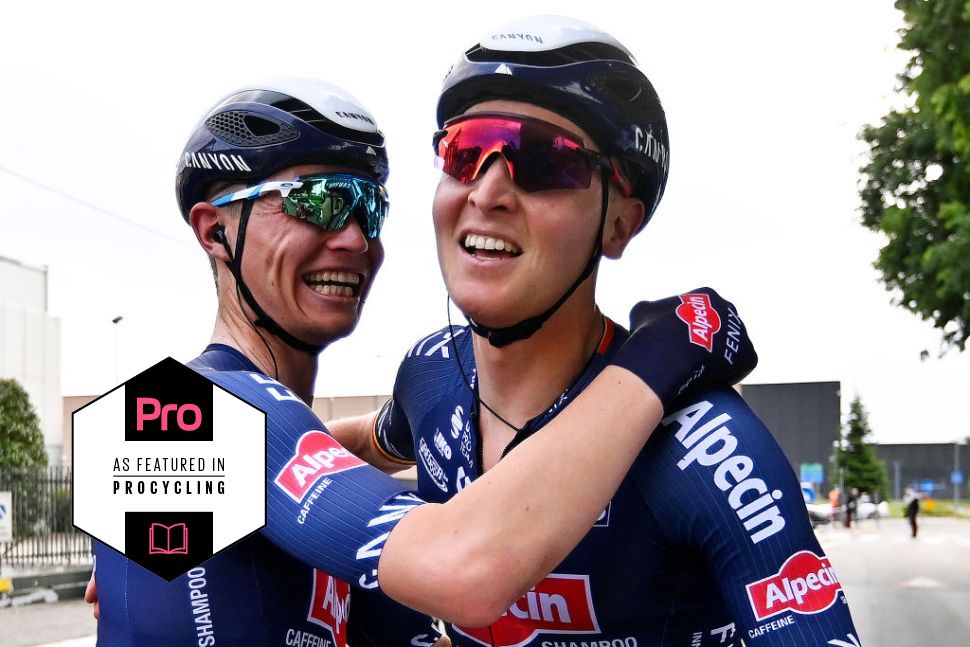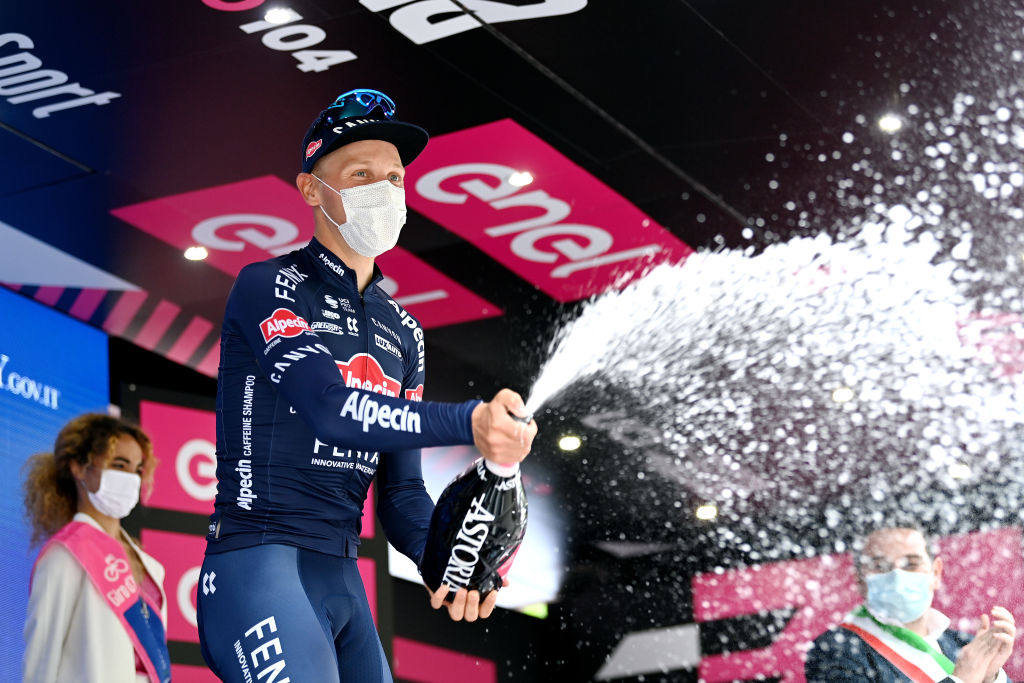Giro d'Italia stage 2 analysis: Alpecin-Fenix off to a winning start
Tim Merlier delivers a win for Alpecin-Fenix on Giro debut

The Giro d’Italia has proved lucky ground for Grand Tour debutants in recent years, with Tim Merlier becoming the third rider in the last five years to win their first ever road stage in a three week race at the Italian Grand Tour. After the 8.6km stage 1 time trial which opened the race, Merlier won stage 2 of the 2021 Giro from a sprint in Novara, following precedent set by Bora-Hansgrohe duo Lukas Pöstlberger and Pascal Ackermann in recent years, who also won on their Grand Tour debuts; Pöstlberger won stage 1 of the 2017 race, and team-mate Ackermann won stage 2 of the 2019 edition.
Yet what makes Merlier’s victory that little bit extra special is that his Alpecin-Fenix team is also racing a Grand Tour for the first time in their history. It’s rare for teams in their inaugural Grand Tour to win stages, particularly those such as Alpecin-Fenix who are there on a wildcard placing. It’s even more rare to do it on the opening road stage, with a rider also treading new ground.
Pöstlberger’s win was a first for his Bora team at the Giro, but the German squad had experienced Grand Tour racing at the Tour de France as NetApp Endura in years before. Sky won the first stage of the 2010 Giro, a few short months after they’d entered the pro peloton, but Bradley Wiggins, who took the time trial victory, had raced multiple Grand Tours by then. Vincenzo Nibali won stage 16 in 2017, during the debut Giro for Bahrain-Merida, but Nibali is a veteran of his home Grand Tour having won the overall title twice beforehand. Gazprom’s Alexander Foliforov was a surprise stage winner during the 2016 Giro, on what was both his and his Russian ProConti squad’s first start in the race. But Foliforov and his team both had to wait until stage 16 for the victory.
Merlier and his Belgian team might be Giro rookies, but here they confidently beat the ‘bigger’, more established sprint teams to take the first round, in a Giro where the sprint competition looks hotly contested. Sprinters ride off confidence and momentum, and the fact that Merlier started the race as the most in-form sprinter, in terms of his wins this year, was a telling sign. Merlier had already taken victories this season at a trio of one-day races in his home country in March; Le Samyn, GP Monsere and Bredene Koksijde Classic. Compare that to his rivals in Italy, in Caleb Ewan, Giacomo Nizzolo, Elia Viviani and Peter Sagan, who all have one win apiece so far this year, while Fernando Gaviria is still waiting for his first win of the season and Dylan Groenewegen is racing for the first time this year.

In a technical finale, featuring two roundabouts with sharp right-hand turns (the latter coming with 1.4km to go), Alpecin were visible at the front of the peloton during the last 10km, a sign of their confidence but also their understanding of the importance of positioning in a finish such as this. While the likes of Viviani, Nizzolo and stage favourite Caleb Ewan were sitting in the middle of the bunch with 6km to go, Alpecin’s Oscar Riesebeek and Belgian champion Dries de Bondt lined up at the front alongside the GC teams, with Merlier in their wheels. Around the second bend, towards the flamme rouge, Merlier still had two team-mates ahead of him and was sitting within the first 10 riders.
With his last lead-out rider swinging off through the chicanes towards the finish line, Merlier waited, following UAE’s Max Richeze and Cofidis’ Simone Consonni, before launching off Viviani’s wheel with 250m to go. Despite it being a long sprint, once the 28-year-old jumped and accelerated, no one could come around him.
There are a possible eight sprint stages in this year's Giro, and even though Ewan, Viviani, Sagan and Groenewegen all hold multiple Grand Tour wins between them, it's Merlier who taken round one. Alpecin-Fenix may be a ProTour level team, but they've confirmed their position at the sprinting top table.
Get The Leadout Newsletter
The latest race content, interviews, features, reviews and expert buying guides, direct to your inbox!
Sophie Hurcom is Procycling magazine's deputy editor.
Procycling magazine: the best writing and photography from inside the world's toughest sport. Pick up your copy now in all good newsagents and supermarkets, or get a Procycling subscription.
Sophie Hurcom is Procycling’s deputy editor. She joined the magazine in 2017, after working at Cycling Weekly where she started on work experience before becoming a sub editor, and then news and features writer. Prior to that, she graduated from City University London with a Masters degree in magazine journalism. Sophie has since reported from races all over the world, including multiple Tours de France, where she was thrown in at the deep end by making her race debut in 2014 on the stage that Chris Froome crashed out on the Roubaix cobbles.